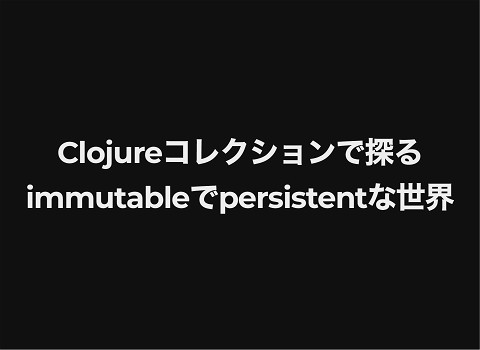MP in Clojure
455 Views
June 17, 17
スライド概要
Why not try MP (monadic programming) in Clojure?
「楽しく楽にcoolにsmartに」を理想とするprogrammer/philosopher/liberalist/realist。 好きな言語はClojure, Haskell, Elixir, English, français, русский。 読書、プログラミング、語学、法学、数学が大好き! イルカと海も大好き🐬
関連スライド
各ページのテキスト
MP in Clojure ~ herding cats with clj ~
Self-introduction lagénorhynque /laʒenɔʁɛ k ̃ / カマイルカ (defprofile lagénorhynque :name "Kent OHASHI" :languages [Clojure Haskell Python Scala English français Deutsch русский] :interests [programming language-learning mathematics] :contributing [github.com/japan-clojurians/clojure-site-ja])
Clojure × MP
Contents 1. What is MP? 2. Why MP in Clojure? 3. How MP in Clojure? 4. Examples
What is MP?
MP = monadic programming programming with monads cf. FP = functional programming
de nition of Monad in Haskell GHC.Base#Monad class Applicative m => Monad m where (>>=) :: forall a b. m a -> (a -> m b) -> m b (>>) :: forall a b. m a -> m b -> m b m >> k = m >>= \_ -> k {-# INLINE (>>) #-} return return :: a -> m a = pure fail fail s :: String -> m a = errorWithoutStackTrace s
monads in Haskell 型クラス Monad のインスタンス >>= : m a -> (a -> m b) -> m b return : a -> m a モナド則(monad laws)を満たす シンプルで合成可能な構造 → 様々な形で利⽤可能 do 記法というシンタックスシュガー
e.g. java.util.Optional jshell> Optional<Integer> a = Optional.of(2) a ==> Optional[2] jshell> Optional<Integer> b = Optional.of(3) b ==> Optional[3] jshell> a.flatMap( x -> ...> b.map( y -> ...> x * y ...> ) ...> ) $3 ==> Optional[6] // with `flatMap` & `map` ※ #渋⾕ java なので⼀応 Java の例から^_^;
e.g. scala.Option
scala> val a = Some(2)
a: Some[Int] = Some(2)
scala> val b = Some(3)
b: Some[Int] = Some(3)
scala> a.flatMap { x =>
|
b.map { y =>
|
x * y
|
}
| }
res0: Option[Int] = Some(6)
scala> for {
|
x <- a
|
y <- b
| } yield x * y
res1: Option[Int] = Some(6)
// with `flatMap` & `map`
// with `for` expression
e.g. Prelude.Maybe
> a = Just 2
> b = Just 3
> :{
| a >>= \x ->
|
b >>= \y ->
|
return $ x * y
| :}
Just 6
> :{
| do
|
x <- a
|
y <- b
|
return $ x * y
| :}
Just 6
-- with `>>=` & `return`
-- with `do` notation
e.g. cats.monad.maybe user=> (require '[cats.core :as m] #_=> '[cats.monad.maybe :as maybe]) nil user=> (def a (maybe/just 2)) #'user/a user=> (def b (maybe/just 3)) #'user/b user=> (m/>>= a (fn [x] ; with `>>=` & `return` #_=> (m/>>= b (fn [y] #_=> (m/return (* x y)))))) #<Just 6> user=> (m/mlet [x a ; with `mlet` macro #_=> y b] #_=> (m/return (* x y))) #<Just 6>
Why MP in Clojure?
MP in Clojure Clojureでは モナドは必須の機能ではないが…… 静的型付け&純粋関数型の⾔語ではないが…… シンプルで汎⽤的なDSL構築フレームワーク Haskellなどで有⽤なアイディアが活かせる ⇒ Clojureでも MP してみよう (*> ᴗ •*)ゞ
How MP in Clojure?
MP libraries in Clojure clojure/algo.monads Macros for defining monads, and definition of the most common monads funcool/cats Category Theory and Algebraic abstractions for Clojure and ClojureScript.
how to support MP in Clojure feature algo.monads cats Monad type class plain Map data protocol do notation macro macro context inference (n/a) protocol
anatomy of algo.monads user=> (require '[clojure.algo.monads :as m]) nil user=> (m/domonad m/maybe-m #_=> [x 2 #_=> y 3] #_=> (* x y)) 6
macroexpand-1 user=> (macroexpand-1 #_=> '(m/domonad m/maybe-m #_=> [x 2 #_=> y 3] #_=> (* x y))) (clojure.algo.monads/with-monad m/maybe-m (m-bind 2 (fn [x] (m-bind 3 (fn [y] (m-result (* x y))))))) clojure.algo.monads/with-monad ?
macroexpand-1 once more user=> (macroexpand-1 *1) (clojure.core/let [name__3075__auto__ m/maybe-m m-bind (:m-bind name__3075__auto__) m-result (:m-result name__3075__auto__) m-zero (:m-zero name__3075__auto__) m-plus (:m-plus name__3075__auto__)] (clojure.tools.macro/with-symbol-macros (m-bind 2 (fn [x] (m-bind 3 (fn [y] (m-result (* x y)))))))) clojure.algo.monads/maybe-m ?
clojure.algo.monads/maybe-m user=> clojure.algo.monads/maybe-m {:m-zero nil, :m-plus #object[clojure.algo.monads$fn__3167$m_plus_maybe__3172 0x77a7 :m-result #object[clojure.algo.monads$fn__3167$m_result_maybe__3168 0x :m-bind #object[clojure.algo.monads$fn__3167$m_bind_maybe__3170 0x142d user=> (class clojure.algo.monads/maybe-m) clojure.lang.PersistentArrayMap just a keyword-function Map
strategy in algo.monads 1. :m-bind, :m-result をkey、対応する関数を valueとしたMapを⽤意 2. マクロによってMapから取り出した関数 m-bind, m-result の組み合わせに変換
anatomy of cats user=> (require '[cats.core :as m] #_=> '[cats.monad.maybe :as maybe]) nil user=> (m/mlet [x (maybe/just 2) #_=> y (maybe/just 3)] #_=> (m/return (* x y))) #<Just 6>
macroexpand-1 user=> (macroexpand-1 #_=> '(m/mlet [x (maybe/just 2) #_=> y (maybe/just 3)] #_=> (m/return (* x y)))) (cats.core/bind (maybe/just 2) (clojure.core/fn [x] (cats.core/bind (maybe/just 3) (clojure.core/fn [y] (do (m/return (* x y))))))) cats.core/bind ? without explicit monad context?
cats.core/bind user=> (source cats.core/bind) (defn bind ;; (docstring here) [mv f] (let [ctx (ctx/infer mv)] (p/-mbind ctx mv (fn [v] (ctx/with-context ctx (f v)))))) nil cats.context/infer ? can infer monad context?
cats.context/infer user=> (source cats.context/infer) (defn infer ;; (docstring here) ;; (0-arity pattern here) ([v] (cond ; blank lines omitted (not (nil? *context*)) *context* (satisfies? p/Contextual v) (p/-get-context v) :else (throw-illegal-argument (str "No context is set and it can not be automatically " "resolved from provided value"))))) nil cats.protocols/Contextual ?
cats.protocols/Contextual user=> (source cats.protocols/Contextual) (defprotocol Contextual "Abstraction that establishes a concrete type as a member of a contex A great example is the Maybe monad type Just. It implements this abstraction to establish that Just is part of the Maybe monad." (-get-context [_] "Get the context associated with the type.")) nil -get-context method
cats.core/bind (again) user=> (source cats.core/bind) (defn bind ;; (docstring here) [mv f] (let [ctx (ctx/infer mv)] (p/-mbind ctx mv (fn [v] (ctx/with-context ctx (f v)))))) nil cats.protocols/-mbind ?
cats.protocols/Monad user=> (source cats.protocols/Monad)) (defprotocol Monad "The Monad abstraction." (-mreturn [m v]) (-mbind [m mv f])) nil -mreturn & -mbind methods
cats.core/bind ( nally) user=> (source cats.core/bind) (defn bind ;; (docstring here) [mv f] (let [ctx (ctx/infer mv)] (p/-mbind ctx mv (fn [v] (ctx/with-context ctx (f v)))))) nil cats.context/with-context ?
cats.context/with-context user=> (source cats.context/with-context) (defmacro with-context "Set current context to specific monad." [ctx & body] `(do (when-not (context? ~ctx) (throw-illegal-argument "The provided context does not implements Context.")) (binding [*context* ~ctx] ~@body))) nil user=> (source cats.context/*context*) (def ^:dynamic *context* nil) nil dynamic Var *context*
strategy in cats 1. Monad プロトコル(-mreturn, -mbind)を実装した コンテキストオブジェクトを⽤意 2. Monad 値は Contextual プロトコルによってコン テキストオブジェクトを取り出せる 3. マクロで関数 bind, return の組み合わせに変換 4. bind は第1引数の Monad 値からコンテキストオブ ジェクトを取り出す(コンテキストの推論) 5. with-context で⼀度推論したコンテキストオブ ジェクトを動的スコープで再利⽤
Examples
example code repositories lagenorhynque/mp-in-clojure cf. lagenorhynque/mp-in-haskell
using monads: safe RPN calculator from Learn You a Haskell for Great Good! 10.1 Reverse Polish Notation Calculator 14.6 Making a Safe RPN Calculator
RPN: reverse Polish notation 861-*2+ ↓ with parentheses ((8 (6 1 -) *) 2 +) ↓ evaluate 42
without monads (defn- folding-function [[x y & ys :as xs] s] (cond (and x y (= s "*")) (conj ys (* y x)) (and x y (= s "+")) (conj ys (+ y x)) (and x y (= s "-")) (conj ys (- y x)) :else (conj xs (Double/parseDouble s)))) (defn solve-rpn [s] (as-> s v (str/split v #"\s+") (reduce folding-function () v) (first v))) naïve implementation
;; valid RPN user=> (solve-rpn "8 6 1 - * 2 +") 42.0 ;; unsupported operator user=> (solve-rpn "8 6 1 - * 2 /") NumberFormatException For input string: "/" ;; invalid number user=> (solve-rpn "8 6 1 - * a +") sun.misc.FloatingDecimal.r NumberFormatException For input string: "a" ;; invalid RPN user=> (solve-rpn "8 6 1 - * 2") 2.0 sun.misc.FloatingDecimal.r
with Maybe monad (defn- read-maybe [s] (try (maybe/just (Double/parseDouble s)) (catch NumberFormatException _ (maybe/nothing)))) (defn- folding-function' [[x y & ys :as xs] s] (cond (and x y (= s "*")) (maybe/just (conj ys (* y x))) (and x y (= s "+")) (maybe/just (conj ys (+ y x))) (and x y (= s "-")) (maybe/just (conj ys (- y x))) :else ((m/lift-m 1 #(conj xs %)) (read-maybe s)))) valid ⇒ just x ; invalid ⇒ nothing lift-m for lifting conj function
(defn solve-rpn' [s] (m/mlet [result (m/foldm folding-function' () (str/split s #"\s+")) :when (= (count result) 1)] (m/return (first result)))) reduce with monadic function using foldm length of result sequence ≠ 1 ⇒ nothing MonadZero cf. MonadPlus, Alternative
;; valid RPN
user=> (solve-rpn' "8 6
#<Just 42.0>
;; unsupported operator
user=> (solve-rpn' "8 6
#<Nothing>
;; invalid number
user=> (solve-rpn' "8 6
#<Nothing>
;; invalid RPN
user=> (solve-rpn' "8 6
#<Nothing>
1 - * 2 +")
1 - * 2 /")
1 - * a +")
1 - * 2")
making monads: probability distribution from Learn You a Haskell for Great Good! 14.8 Making Monads
probability distribution e.g. 6-sided die n p 1 1/6 2 1/6 3 1/6 4 1/6 5 1/6 6 1/6
implementing Prob monad (deftype Prob [v] p/Contextual (-get-context [_] context) p/Extract (-extract [_] v) p/Printable (-repr [_] (str "#<Prob " (pr-str v) ">")) Object (equals [this obj] (= (.v this) (.v obj)))) define the data type Prob
(def context (reify ;; (other protocol implementations here) p/Monad (-mreturn [m v] (p/-pure m v)) (-mbind [_ mv f] (assert (prob? mv) (str "Context mismatch: " (p/-repr mv) " is not allowed to use with prob context.")) (->Prob (for [[x p] (p/-extract mv) [y q] (p/-extract (f x))] [y (* p q)]))) ;; (below omitted) define the context object for Prob
(defn uniform [s] ; sequence (let [n (count s)] ; -> Prob value of uniform distribution (->> s (map (fn [x] [x (/ 1 n)])) ->Prob))) (defn prob->dist [prob] ; Prob value -> Map of distribution (letfn [(add-prob [d [x p]] (update d x (fnil #(+ % p) 0)))] (reduce add-prob {} (p/-extract prob)))) define factory/conversion functions
sum of 2 dice
user=> (def die (range 1 (inc 6)))
#'user/die
user=> (def prob
#_=>
(m/mlet [d1 (uniform die)
#_=>
d2 (uniform die)]
#_=>
(m/return (+ d1 d2))))
#'user/prob
user=> prob
#<Prob ([2 1/36] [3 1/36] [4 1/36] [5 1/36] [6 1/36] [7 1/36] [3 1/36]
user=> (prob->dist prob)
{7 1/6, 4 1/12, 6 5/36, 3 1/18, 12 1/36, 2 1/36, 11 1/18,
9 1/9, 5 1/9, 10 1/12, 8 5/36}
Monty Hall problem
user=> (def doors #{:a :b :c})
#'user/doors
user=> (prob->dist
#_=> (m/mlet [prize (uniform doors)
#_=>
choice (uniform doors)]
#_=>
(m/return (if (= choice prize)
#_=>
:win
#_=>
:lose))))
{:win 1/3, :lose 2/3}
user=> (prob->dist
#_=> (m/mlet [prize (uniform doors)
#_=>
choice (uniform doors)
#_=>
opened (uniform (disj doors prize choice))
#_=>
choice' (uniform (disj doors opened choice))]
#_=>
(m/return (if (= choice' prize)
#_=>
:win
#_=>
:lose))))
{:lose 1/3, :win 2/3}
Vive les S-expressions ! Long live S-expressions!
Further Reading clojure/algo.monads khinsen/monads-in-clojure funcool/cats 独習 Scalaz / learning Scalaz 猫番 / herding cats モナド (プログラミング) - Wikipedia
『すごいHaskellたのしく学ぼう!』/ Learn You a Haskell for Great Good! 第14章 もうちょっとだけモナド / For a Few Monads More 10.1 逆ポーランド記法電卓 / Reverse Polish Notation Calculator 14.6 安全な逆ポーランド記法電卓を作ろう / Making a Safe RPN Calculator 14.8 モナドを作る / Making Monads
Haskell の Monad とは⾔語内DSLのフレームワー クである Functor, Applicative, Monadのシンプルな定式化 継承によらないポリモーフィズム実現⼿法 思ったほど怖くない! Haskell on JVM 超⼊⾨ MP in Scala cf. MP in Haskell Free Monads Getting Started
- https://www.slideshare.net/KentOhashi/mp-in-haskell
- http://d.hatena.ne.jp/kazu-yamamoto/20150128/1422413182
- http://qiita.com/lagenorhynque/items/e68ada9ee2d63539eb45
- http://qiita.com/lagenorhynque/items/389679018aafaabd2d24
- https://www.slideshare.net/y_taka_23/haskell-on-jvm-jjugccc-cccl8
- https://www.slideshare.net/KentOhashi/mp-in-scala
- https://www.slideshare.net/KentOhashi/free-monads-getting-started





